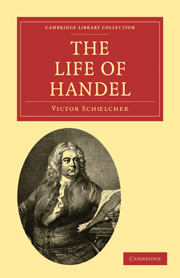Book contents
- Frontmatter
- LIST OF WORKS CONSULTED BY THE AUTHOR
- PREFACE
- Contents
- CHAPTER I 1685–1708
- CHAPTER II 1708–1720
- CHAPTER III 1720–1729
- CHAPTER IV 1729–1732
- CHAPTER V 1733
- CHAPTER VI 1733–1737
- CHAPTER VII 1737–1741
- CHAPTER VIII 1741–1742
- CHAPTER IX 1742–1752
- CHAPTER X 1752–1759
- CHAPTER XI
- CHAPTER XII
- APPENDIX
- LIST OF MUSIC SACRED, SECULAR, AND INSTRUMENTAL
- INDEX
CHAPTER VIII - 1741–1742
Published online by Cambridge University Press: 29 August 2010
- Frontmatter
- LIST OF WORKS CONSULTED BY THE AUTHOR
- PREFACE
- Contents
- CHAPTER I 1685–1708
- CHAPTER II 1708–1720
- CHAPTER III 1720–1729
- CHAPTER IV 1729–1732
- CHAPTER V 1733
- CHAPTER VI 1733–1737
- CHAPTER VII 1737–1741
- CHAPTER VIII 1741–1742
- CHAPTER IX 1742–1752
- CHAPTER X 1752–1759
- CHAPTER XI
- CHAPTER XII
- APPENDIX
- LIST OF MUSIC SACRED, SECULAR, AND INSTRUMENTAL
- INDEX
Summary
The league which was banded against Handel was so powerful, that for three years his efforts to win fortune back were entirely thrown away. Even his finest English works did not escape this fatal destiny. In spite of his courage and activity, both of which were immense, and indefatigable as his genius, he could not retrieve himself from ruin. The position was a cruel one.
For a long time he had been wished for in Ireland. The Duke of Devonshire, the Lord Lieutenant (more generally called Viceroy at that time), had directly invited him to pay a visit to that country, and the Irish professed great admiration for him. The numerous musical societies of this country had already often performed his works. He might therefore expect to find there a public more enlightened, or at any rate more favourably disposed than that of London, and he resolved to make the journey.
Almost all the musical societies of Dublin, which were composed of amateurs, gave their entertainments for the furtherance of charitable objects. Handel put himself into communication with the most important of these, that “for the benefit and enlargement of poor distressed prisoners for debt in the several marshalseas of the city of Dublin,” and promised to give an oratorio for its benefit; the members, on their part, promising the assistance of their chorus and their orchestra. This society did good with real devotedness. Faulkner's Journal of the 14th to the 17th of March, 1740 (O.S.), says, that during the past year1 they “have already released 188 miserable persons of both sexes.
- Type
- Chapter
- Information
- The Life of Handel , pp. 239 - 275Publisher: Cambridge University PressPrint publication year: 2009First published in: 1857

